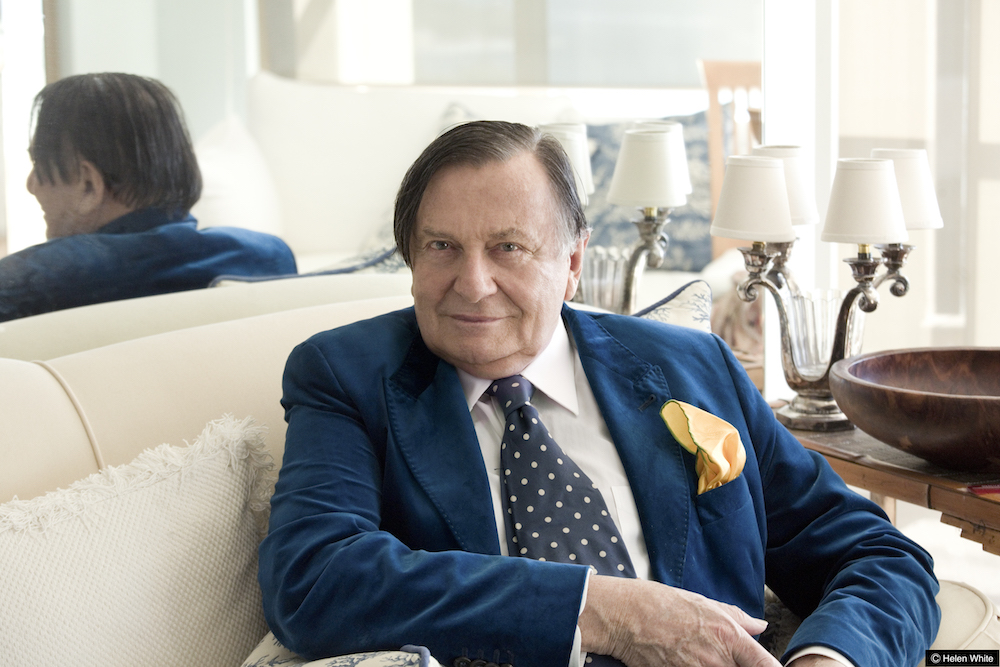★★★★★ | Barry Humphries’ Weimar Cabaret
What’s your deepest impression of Barry Humphries? The tacky, kitsch-bitch supreme Dame Edna Everage, all ghastly, C&A drag and granny glasses, or worse, the snot-and dandruff spattered Sir Les Patterson?

Hopefully, it’s neither. See, the true Barry Humphries is a deeply cultured graduate of the fine arts, and has written definitive articles on eccentric, human sexuality. He’s also a superb character actor, to the extent audiences mistake his Sir Les Patterson creation for a genuine Ambassador of Australian culture! And if Brits, unfairly, accuse Americans of misunderstanding irony, it’s sheer, poetic justice that they’re completely insensitive to Barry Humphries’ deathly dry, Australian wit.
There’s a reason for that, of course – what ex-colonial, reactionary, right-wing regime can bear ridicule?
Not Little Britain, that’s for sure, and Humphries, initially, works hard to win over a cold, deeply monied and highly privileged Chelsea audience. Still, he’s a charming and infectiously erudite bon vivant, all barrel-chest, squat neck and deliberately ironic, his physicality eluding rigid, anal-retentive analysis. Quite simply, the audience – many of whom have never seen the real Humphries – don’t know what to make of him, suspending their typical, pack-mentality persecution prejudices. Oh, don’t get me wrong, many hardcore Conservatives adore the arts – remember David Mellor, anyone? – but often, they view culture as shockingly disposable.
Not tonight, perhaps. ‘I’m doing my hardest impersonation ever tonight’ Humphries quips, ‘myself’.
Too true, and Humphries’ actual, authoritative, deeply knowledgeable self is instantly seductive company. Always ferociously anti-fascist and bitterly opposed to any suppression of human diversity, he’s a tireless champion of Berlin’s Weimar Republic, immortalised by Christopher Isherwood’s Cabaret.
Never heard of the Weimar Republic? Google it ASAP – it’s essential queer history. An inter-wars, sexually diverse paradise, the Republic briefly flourished from 1919-1933, an intense island of queer resistance against crushing, hetero-normative banality. And Humphries, obviously, is in his element, showcasing the cream of Weimar musicality – his entire career has hilariously skewered homophobia on the spot.
So naturally, his Weimar night shares a treasure-chest of subversive memories. Discovering stacks of obscure, German sheet-music in late 1940s Melbourne, Humphries, enthralled, tracked down any possible recordings and information on the Weimar Republic. Many otherwise utterly obscure composers – Krenek, Spoliansky, Schulhoff and Hollaender – set cynical, Weill and Brechtian lyrics into thrillingly mutated music fusing American jazz and indigenous folk motifs.
And that music, of course – soon becoming the vital staples of furiously transgessive cabaret throughout Berlin – was pure poison to Germany’s ultra-reactionary, proto-Nazis. Physical, sexual and emotional spontaneity – all encouraged and cemented by Weimar’s signature, polyrhythmic musical delights – was seen as instantly inflammatory, undermining every fascist orthodoxy.
Tragically, with the brutal rise of Nazi supremacy in 1933, Weimar was immediately suppressed, but Humphries’ gorgeously provocative time-capsule of the era suggests what we’ve lost. Appropriately, he’s accompanied by mischievous, multi-talented diva Meow-meow, channelling as always the spirit, attitude and killer glamour of every possible living drag queen! Yes, Meow-meow is a biological female, but far more than fellow, drag manqué Holestar, Meow-meow performs her femininity as an intoxicating artificiality she’s just discovered. Does it work? Oh god, yes – as sublimely as Ru Paul in full, killer-queen mode, and visiting and inhabiting Weimar’s music simply demands a hugely exaggerated reality!

It’s a theme that extends, even, to Humphries’ backing chamber orchestra, all uniformly dressed in sharp, Bohemian black, all Joel Grey trilbies for men and women. And the music’s a revelation, all instantly contagious, colloquial melodies grafted to the spare bones of classicism and non-European, imported tonalities. Yes, there’s some expected, Weimar favourites – ‘Pirate Jenny’ and ‘Surabaya Johhny’ – but the stand-out is Erwin Schulhoff’s ‘Dada masterpiece’, the Sonata Erotica.
Bearing radical, avant-garde comparison to John Cage’s 4.33’ – four minutes of silence with the score considered any random sounds within that time – Sonata Erotica still startles. Exuberantly performed by Meow-meow, it’s orgasmic moaning, pants and screeching delivered as fine, operatic art, the most joyous, unrestrained expression of subversive sexuality possible!
No wonder Humphries, after an awkward but endearing dance with Meow-meow, finally exits with an ecstatic grin- he’s just mentally liberated yet another slice of Little Britain!
Follow Sasha DeSuinn on Twitter



